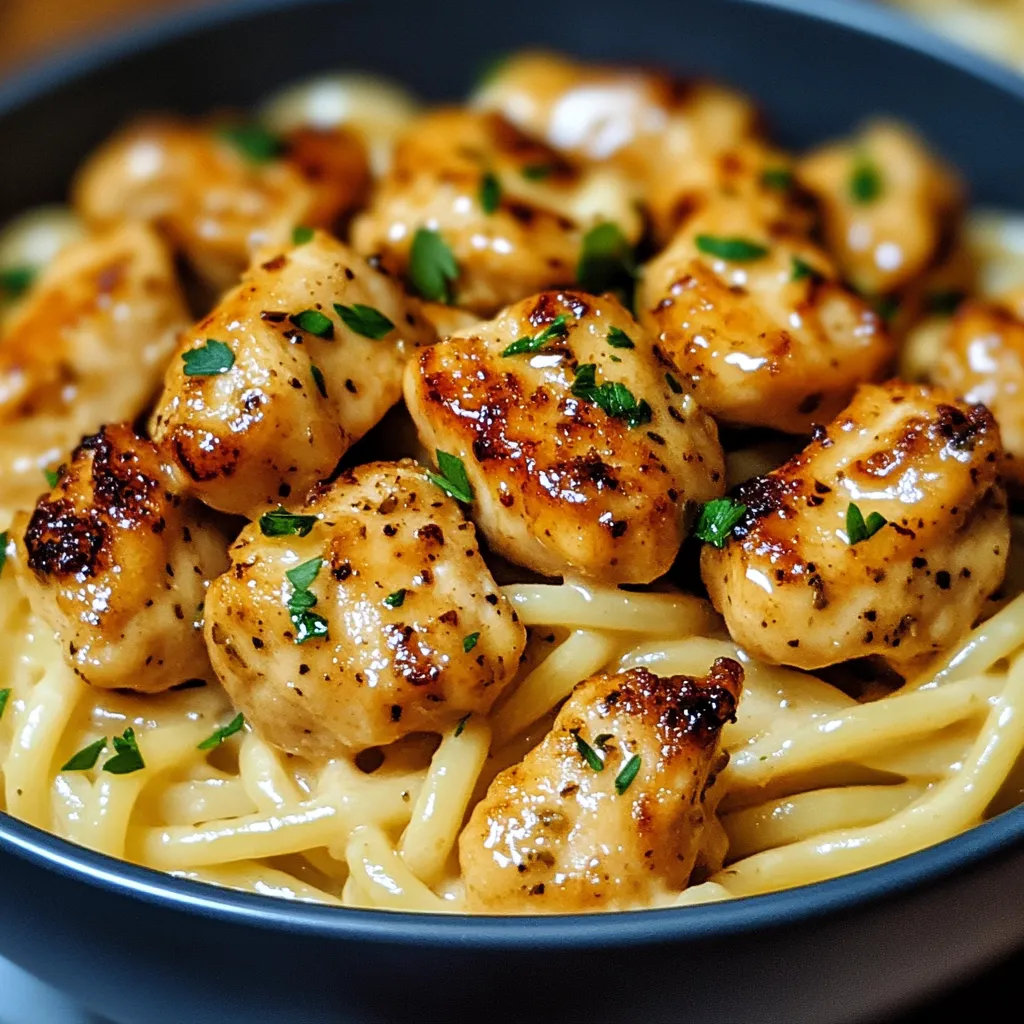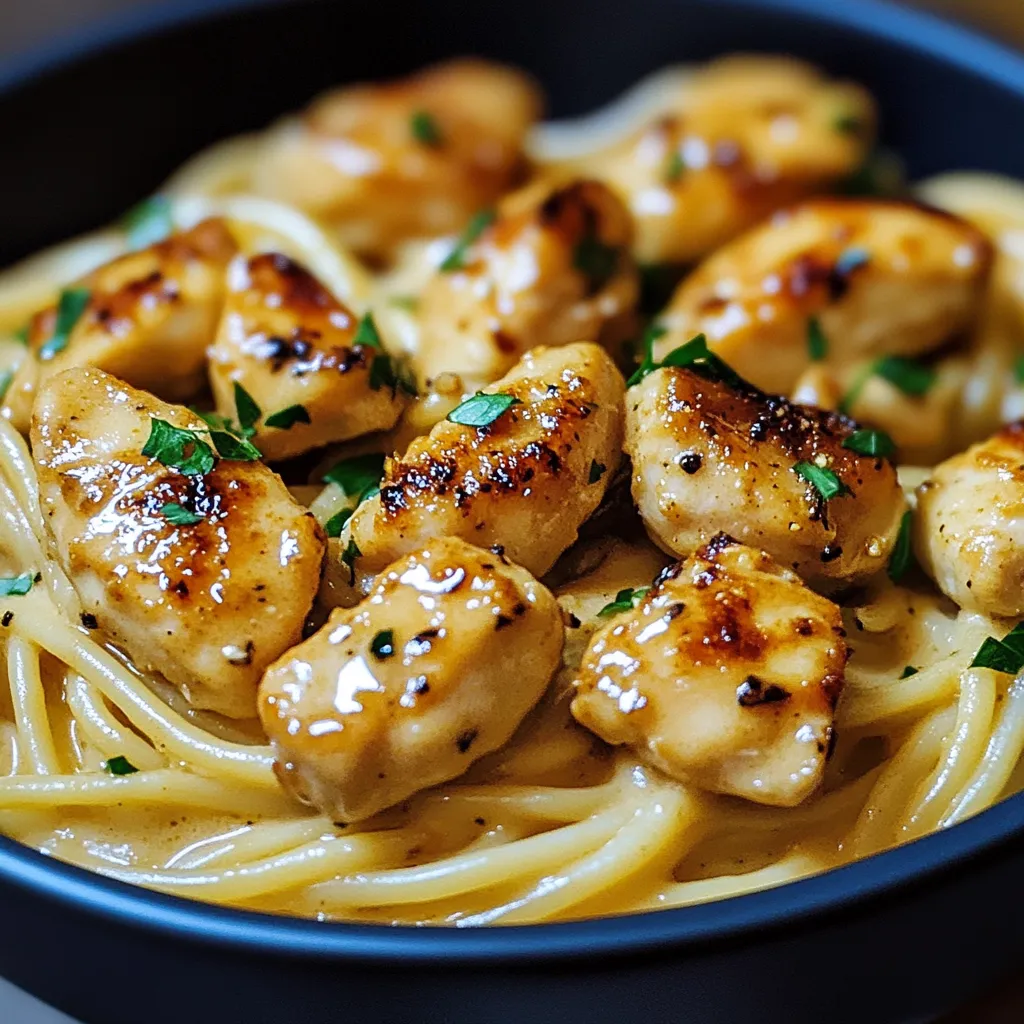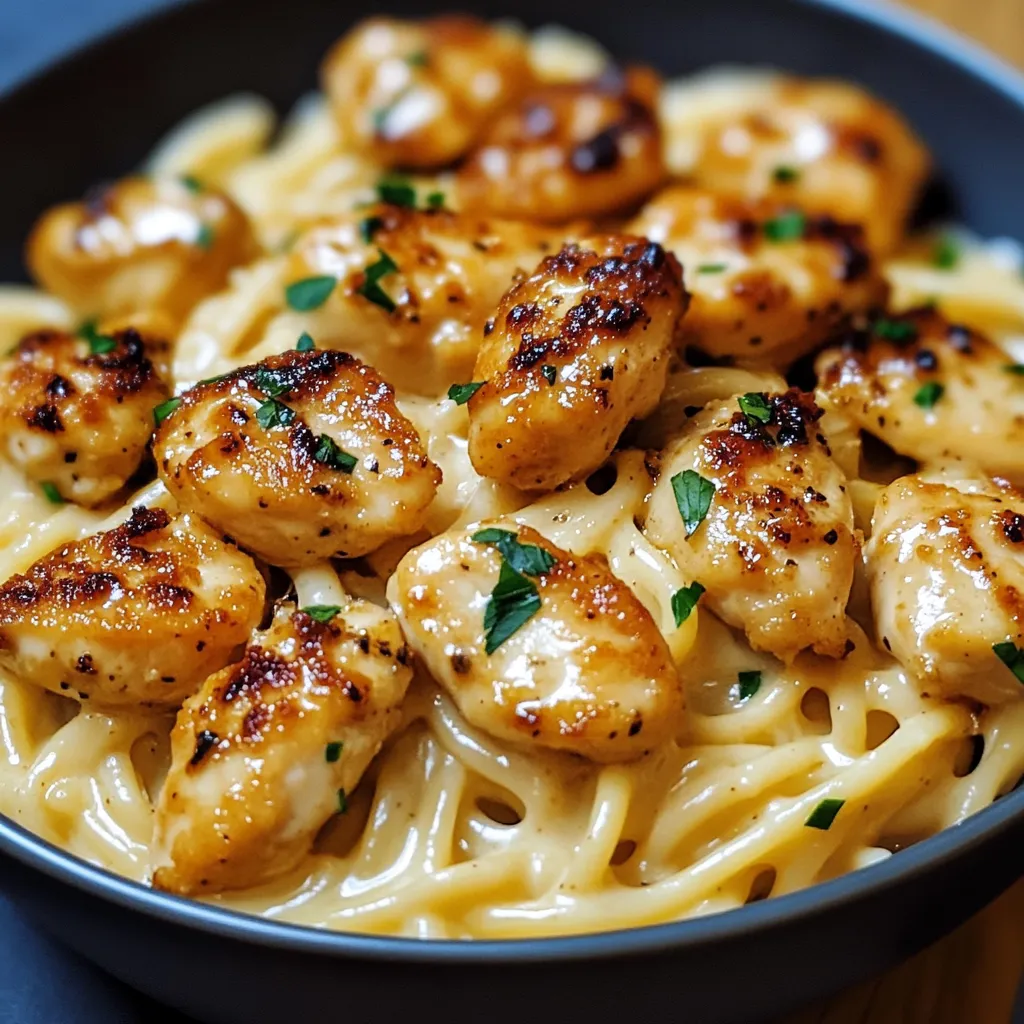 Pin it
Pin it
Golden chicken morsels nestled among silky pasta strands create an irresistible weeknight masterpiece. This harmonious combination delivers tender, garlic-infused chicken alongside creamy, cheese-laden pasta that twirls perfectly around your fork. The rich butter sauce unifies both elements, creating a cohesive dish that satisfies deep comfort food cravings while remaining surprisingly simple to prepare. Each bite offers the perfect balance of protein and carbohydrates, wrapped in a blanket of savory, aromatic flavors that linger pleasantly on the palate.
The first time I prepared this dish was during a particularly hectic week when elaborate cooking seemed impossible. My typically picky seven-year-old, who normally pushes pasta around his plate without enthusiasm, cleared his entire serving and asked for seconds. My husband later confessed he had secretly packed the small amount of leftovers for his lunch before anyone else could claim them. Something about the combination of these humble ingredients creates a dining experience that feels special despite its simplicity.
Perfect Ingredients
- Boneless chicken breasts: Form the protein foundation with their tender texture and mild flavor. Slicing into even, bite-sized pieces ensures quick, consistent cooking without dryness.
- Unsalted butter: Creates the luxurious base for both chicken and pasta components. European-style butter with higher fat content offers superior flavor if available.
- Fresh garlic: Provides aromatic foundation that transforms ordinary ingredients into something extraordinary. Mince finely rather than press for better texture and controlled flavor release.
- Paprika: Adds gentle warmth and beautiful color to chicken without overwhelming heat. Hungarian varieties offer particularly rich, complex flavor.
- Italian seasoning: Introduces Mediterranean herb notes with remarkable efficiency. This herb blend eliminates measuring multiple dried herbs individually.
- Fettuccine pasta: Creates the ideal vehicle for capturing creamy sauce in each strand. The flat, ribbon shape holds sauce beautifully compared to tubular pasta.
- Heavy cream: Forms the silky base of the pasta sauce without requiring flour thickeners. Look for cream with at least 36% milk fat for proper thickening properties.
- Parmesan cheese: Delivers nutty, savory depth while thickening sauce naturally. Freshly grated melts infinitely better than pre-grated varieties with anti-caking additives.
- Fresh nutmeg: Enhances cream sauce with subtle warmth and complexity. Just a small amount transforms the flavor profile without dominating.
- Fresh parsley: Brightens the finished dish with color and herbaceous freshness. The slight pepperiness cuts through richness beautifully.
Cooking Process
- Pasta Perfection:
- Begin by bringing abundantly salted water to a rolling boil before adding pasta—the water should taste briny like seawater. Cook pasta precisely to al dente stage, typically one minute less than package directions suggest, as it will continue cooking slightly when tossed with hot sauce. Reserve pasta water before draining, as this starchy liquid helps create silky sauce consistency when needed. Rinse pasta only if not proceeding immediately with sauce preparation to prevent unnecessary cooling and starch removal.
- Chicken Mastery:
- Season chicken pieces thoroughly before cooking, allowing salt and spices to adhere evenly to each morsel. Heat pan adequately before adding fat to ensure proper searing rather than steaming. Space chicken pieces sufficiently in the pan to prevent overcrowding, which creates steam and prevents golden crust formation. Cook undisturbed initially to develop caramelization, then stir gently to maintain piece integrity. Add garlic only during the final cooking minute to prevent burning while still developing aromatic qualities.
- Sauce Creation:
- Utilize the same pan after cooking chicken to capture all developed flavor compounds. Begin sauce with butter and fresh garlic, cooking just until fragrant without browning. Add cream slowly while whisking constantly to prevent temperature shock that might cause separation. Simmer gently rather than boiling vigorously, which can break the emulsion. Incorporate cheese gradually with constant motion, allowing each addition to melt completely before adding more. The finished sauce should coat the back of a spoon while still flowing gracefully.
- Perfect Assembly:
- Combine pasta with sauce immediately after draining to prevent sticking and allow proper sauce absorption. Toss thoroughly using tongs with gentle lifting motion rather than stirring, which can break pasta strands. Add reserved pasta water by tablespoonfuls only if needed to adjust consistency—the sauce will continue thickening slightly as it cools. Position chicken pieces attractively over sauced pasta rather than mixing throughout to maintain their texture integrity and visual appeal.
 Pin it
Pin it
My first attempt at this recipe taught me valuable lessons about patience and heat management. When I rushed the process by cooking chicken over too-high heat, I ended up with beautifully browned exteriors but slightly undercooked centers. Now I maintain medium heat consistently and allow slightly more time, resulting in perfectly juicy chicken throughout. Similarly, I discovered that allowing the cream sauce to simmer gently for an extra minute or two before adding cheese creates remarkable flavor development without risk of separation or graininess. These simple adjustments transformed good results into exceptional ones.
Serving Suggestions
Elevate your chicken and pasta experience by pairing with simple arugula salad dressed with lemon vinaigrette for peppery contrast to the rich main dish. Consider serving alongside roasted asparagus spears or broccolini for vibrant color and nutritional balance. For entertaining, present in wide, shallow bowls with dramatic swirls of pasta and chicken arranged attractively on top. Wine enthusiasts appreciate how a crisp Pinot Grigio complements the creamy sauce without overwhelming the delicate flavors. During cooler months, garlic bread or warm focaccia provides the perfect accompaniment for capturing every drop of the remarkable sauce.
Flavor Variations
Transform this classic by incorporating sun-dried tomatoes and baby spinach into the sauce for Mediterranean flair and beautiful color contrast. Create depth with mushroom addition by sautéing sliced cremini mushrooms alongside chicken for earthy complexity. Experiment with different cheese combinations such as adding fontina or asiago to the Parmesan for distinctive flavor profiles. Incorporate herbs such as basil, thyme, or tarragon for seasonal adaptations that highlight fresh market ingredients. Consider a lemon variation by adding fresh zest and juice to brighten the entire dish for summer enjoyment.
Storage Success
Maintain optimal texture by storing chicken and pasta components separately when possible in airtight containers. Refrigerate for up to three days, though quality is significantly better during the first two days. Reheat pasta gently in a skillet over low heat, adding a splash of cream or milk to revive sauce consistency. For chicken, brief warming in a covered skillet with a small amount of butter prevents drying while restoring flavor vibrancy. Avoid microwave reheating if possible as it creates uneven warming and potential sauce separation. For make-ahead preparation, cook components separately and refrigerate, then reheat and combine just before serving for the freshest results.
The journey to perfect garlic butter chicken and creamy pasta taught me to appreciate how cooking order impacts final results. When I reversed my usual process—cooking pasta first, then preparing chicken and sauce—everything reached the table at optimal temperature and texture. Now I always begin by setting pasta water to boil, then prepare chicken while waiting for the water to heat. This simple adjustment in workflow creates remarkable improvement in the final dish, proving that sometimes the most significant enhancements come not from ingredient changes but from technique refinement. Even the most straightforward recipes benefit from thoughtful execution.
 Pin it
Pin it
Frequently Asked Questions
- → Can I use a different type of pasta?
- Penne or fettuccine work best, but you can try other types of pasta.
- → Can I make the sauce ahead of time?
- Yes, you can make the sauce ahead of time and store it in the refrigerator.
- → Can I freeze the leftovers?
- Yes, you can freeze the leftovers in an airtight container for up to 3 months.
- → Can I use a different type of cheese?
- Parmesan cheese works best for this recipe, but you can experiment with other types of cheese.
- → How should I store the leftovers?
- Store the leftovers in an airtight container in the refrigerator for up to 3 days.
